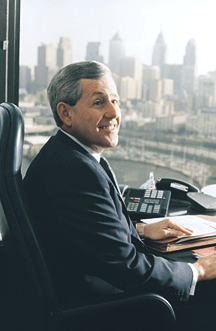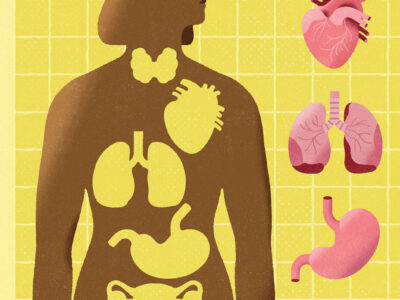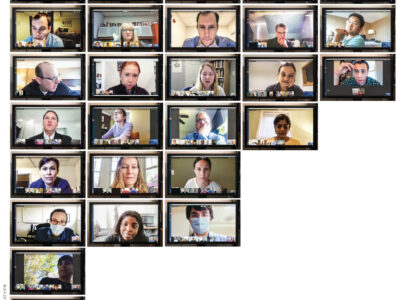
Two fiscal years ago, the University of Pennsylvania Health System posted a $198 million operating loss. Last year, it lost $30 million. This year, it will end up in the black. And this past May, the man deemed instrumental in righting its fiscal ship—Dr. Robert D. Martin —was appointed permanent chief executive officer. He had been interim CEO for the previous 10 months, and before that had been serving as chief operating officer since March 1999.
“Since becoming interim CEO last July, Robert has been leading the financial turnaround of the Health System,” said Dr. Judith Rodin CW’66, president of the University. His upgrade to permanent CEO, she added, is a “recognition of his stewardship during these demanding times.”
The 53-year-old Martin, whose master’s degree and Ph.D. are in economics and finance, is the Health System’s third CEO in the last 18 months. After Dr. William N. Kelley was ousted as CEO and dean of the School of Medicine in February 2000, Dr. Peter G. Traber took the reins, but resigned four months later to take a position with GlaxoSmithKline, the pharmaceutical firm. Dr. Arthur Asbury is serving as interim dean while the University searches for a permanent dean.
Asked what the advantage is to separating the positions of dean and CEO, Martin replied: “I think the primary advantage is to enable the business enterprise—the clinical-delivery system—to be focused on the discipline that’s necessary, in a very competitive marketplace, to be successful.”
The word focused is a key word for Martin, who came to Penn in August 1997 as executive director of Clinical Care Associates, the Health System’s primary-care network. (Before that, he served as chief administrative officer and treasurer to the board of governors at the Mayo Clinic in Scottsdale, Arizona, and as senior vice president for finance and administration and as chief financial officer for Scottsdale Memorial Health Systems.)
“Our organization has been focused on making sure we’ve been using our resources very, very appropriately,” he says. “We’ve had a little bit of improvement in revenue, but the primary thing is the continued disciplined way that we’ve managed costs and expenses. And I know that we’ve done that without compromising patient care. We are completely and unambiguously committed to doing whatever is necessary to ensure that the quality of our patient care is not compromised. If that’s your focus, day in and day out, that’s the outcome you will get.”
After the Health System lost nearly $300 million in fiscal 1998 and 1999—deficits that led to a downgrading of its own bond rating and that of the University—some 2,800 positions were eliminated, roughly 20 percent of its workforce. The possibility of selling off some of the Health System’s hospitals and other components was also seriously considered until this past February, when a joint committee of medical faculty and University trustees recommended that a separate, not-for-profit 501(c)(3) corporation, wholly owned by the University, be established for the Health System, its hospitals, doctor’s practices, and walk-in treatment centers [“Gazetteer,” March/April].
In addition to “working smarter” and “being more effective in our use of resources,” Martin notes that the Health System saved “tens of millions of dollars” by “flattening our structure, eliminating 25 executive-officer positions, mostly in the area of overhead.”
As proof of the quality of its patient care, the Health System points to its flagship, the Hospital of the University of Pennsylvania, which was named one of the nation’s top 10 “Honor Roll” hospitals by U.S. News & World Report in its most recent survey, and to the School of Medicine, ranked fourth in the nation. The medical school is also ranked second in terms of research funding granted by the National Institutes of Health.
Having posted a profit of $18.5 million in the first half of fiscal 2001 (which ended June 30), Martin said the third quarter was also “very profitable” for the Health System. The final results for the year will not be available for several months.
But, said Martin: “We’re doing great, and we’re going to continue to do great.”




